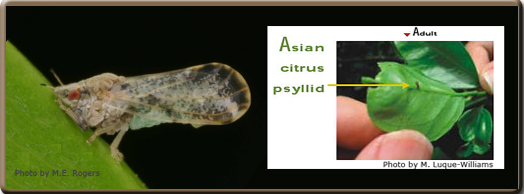
UPDATE: The Asian citrus psyllid (ACP) Quarantine covers Tulare County, in its entirety, following the detection of two psyllids in the City of Tulare. The first ACP was detected in a trap in a residential neighborhood on September 10, in the City of Tulare. The second detection was on September 17, also in a residential setting within the City of Tulare. These detections, when added to previous detections elsewhere in the county, dictate that a county-wide quarantine is the most effective response to contain the pest. A map is available online at: www.cdfa.ca.gov/plant/go/acp-quarantine
The quarantine prohibits the movement of host nursery stock out of the quarantine area and requires that all citrus fruit be either cleaned of leaves and stems or treated in a manner to eliminate ACP prior to moving out of the quarantine area. Residents with backyard citrus trees in the quarantine area are asked to not remove fruit from the quarantine area.
In addition to quarantines in portions of Fresno, Kern, and San Luis Obispo counties, ACP entire-county quarantines remain in place in Imperial, Los Angeles, Orange, Riverside, San Bernardino, San Diego, Santa Barbara, and Ventura counties.
The ACP is an invasive species of grave concern because it can carry the disease huanglongbing (HLB), also known as citrus greening. All citrus and closely related species are susceptible hosts for both the insect and the disease. There is no cure once a tree becomes infected. The diseased tree will decline in health until it dies.
HLB has been detected just once in California – in 2012 on a single residential property in Hacienda Heights, Los Angeles County. HLB is known to be present in Mexico and in parts of the southern U.S. Florida first detected the psyllid in 1998 and the disease in 2005, and the two have been detected in all 30 citrus-producing counties in that state. The University of Florida estimates the disease has tallied more than 6,600 lost jobs, $1.3 billion in lost revenue to growers and $3.6 billion in lost economic activity. The disease is present in Georgia, Louisiana, South Carolina, and Texas. The states of Alabama, Arizona, Hawaii, and Mississippi have detected the pest but not the disease.
Residents in the area who think they may have seen the Asian citrus psyllid are urged to call CDFA’s Pest Hotline at 1-800-491-1899. For more information on the Asian citrus psyllid and huanglongbing disease, please visit: www.cdfa.ca.gov/go/acp
Featured Photos, Source: M.E. Rogers, M. Luque-Williams, on CDFA website, “ASIAN CITRUS PSYLLID PEST PROFILE“
Citrus Pest and Disease Prevention Committee Vacancy
The California Department of Food and Agriculture is announcing one vacancy on the Citrus Pest and Disease Prevention Committee. The Committee advises the CDFA secretary on activities associated with the statewide citrus specific pest and disease work plan that includes, but is not limited to outreach and education programs and programs for surveying, detecting, analyzing, and treating pests and diseases specific to citrus.
The members receive no compensation, but are entitled to payment of necessary travel expenses in accordance with the rules of the Department of Personnel Administration.
A committee member vacancy exists for a grower representative from Tulare County and will expire on September 30, 2017. Applicants should have an interest in agriculture and citrus pest and disease prevention. Individuals interested in being considered for a committee appointment should send a brief resume by November 1, 2014 to the California Department of Food and Agriculture, Plant Health and Pest Prevention Services, 1220 N Street, Room 221, Sacramento, California 95814, Attention: Victoria Hornbaker.
For additional information, contact: Victoria Hornbaker, Program Manager at (916) 654-0317, or e-mail (Victoria.hornbaker@cdfa.ca.








